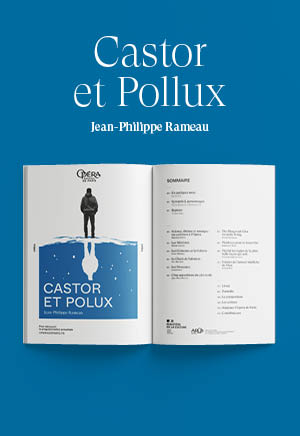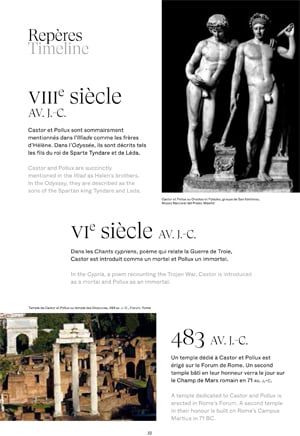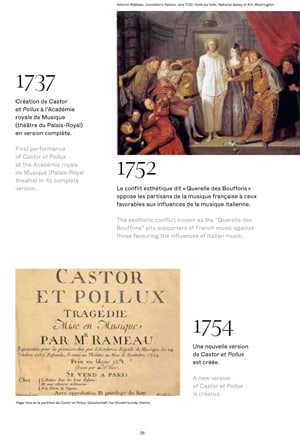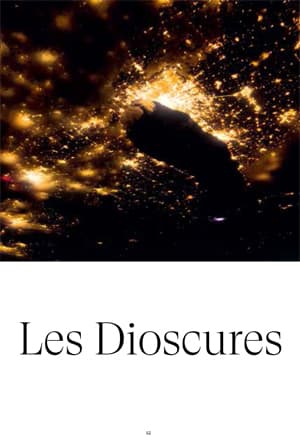Synopsis
A return to its roots for Castor et Pollux, Jean-Philippe Rameau’s lyric tragedy first performed in 1737 at the Académie royale and inspired by the mythological episode of the Gemini.
Rarely performed in its original version – the score was reworked by Rameau himself in 1754 –, this daring work plays on contrasts and expressiveness, as in the famous “Tristes apprêts”. The aria is sung by Télaïre mourning the death of her fiancé Castor, killed in battle, before his twin brother Pollux descends into the Underworld to ask his father, Jupiter, to bring him back to life.
While this opera celebrates brotherly love, its prologue poses an essential question for director Peter Sellars: how do you stop a war and its attendant hatred and resentment?
Artists
Lyric tragedy with a prologue and five acts (1737)
Creative team
Cast
Orchestre et Choeurs Utopia
Dance and choreography: Christopher Beaubrun, Jin Lee Baobei, Andrew Coleman dit « Finesse », Xavier Days dit « X », Ablaye Diop, Ange Emmanuel dit « Kendrickble », Kenza Kabisso, Joshua Morales dit « Sage », Tom Mornet Bouchiba dit « Tomorrow », Cordell Purnell dit « Storm », Sarah Querut, Edwin Saco dit « Jamsy », Océane Valence
“Castor et Pollux” will be recorded by France Musique for broadcast on February 22 at 8 pm in the program ‘Samedi à l'opéra’ presented by Judith Chaine, then available for streaming on the France Musique website and Radio France app.
Media
Access and services
Palais Garnier
Place de l'Opéra
75009 Paris
Public transport
Underground Opéra (lignes 3, 7 et 8), Chaussée d’Antin (lignes 7 et 9), Madeleine (lignes 8 et 14), Auber (RER A)
Bus 20, 21, 27, 29, 32, 45, 52, 66, 68, 95, N15, N16
Calculate my routeCar park
Parking Q-Park Edouard VII and Q-Park Meyerbeer 16 rue Bruno Coquatrix 4 rue de la Chaussée d'Antin 75009 Paris
Book your spot at a reduced price-
Cloakrooms
Free cloakrooms are at your disposal. The comprehensive list of prohibited items is available here.
-
Bars
Reservation of drinks and light refreshments for the intervals is possible online up to 24 hours prior to your visit, or at the bars before each performance.
-
Restaurant
CoCo is open every day from 12:00 pm to 2:00 am. More information on coco-paris.com or at +33 1 42 68 86 80 (reservations).
At the Palais Garnier, buy €10 tickets for seats in the 6th category (very limited visibility, two tickets maximum per person) on the day of the performance at the Box offices.
In both our venues, discounted tickets are sold at the box offices from 30 minutes before the show:
- €35 tickets for under-28s, unemployed people (with documentary proof less than 3 months old) and senior citizens over 65 with non-taxable income (proof of tax exemption for the current year required)
- €70 tickets for senior citizens over 65
Get samples of the operas and ballets at the Paris Opera gift shops: programmes, books, recordings, and also stationery, jewellery, shirts, homeware and honey from Paris Opera.
Palais Garnier
- Every day from 10 a.m. to 6:30 p.m. and until performances end
- Get in from Place de l’Opéra or from within the theatre’s public areas
- For more information: +33 1 53 43 03 97
Online
Palais Garnier
Place de l'Opéra
75009 Paris
Public transport
Underground Opéra (lignes 3, 7 et 8), Chaussée d’Antin (lignes 7 et 9), Madeleine (lignes 8 et 14), Auber (RER A)
Bus 20, 21, 27, 29, 32, 45, 52, 66, 68, 95, N15, N16
Calculate my routeCar park
Parking Q-Park Edouard VII and Q-Park Meyerbeer 16 rue Bruno Coquatrix 4 rue de la Chaussée d'Antin 75009 Paris
Book your spot at a reduced price-
Cloakrooms
Free cloakrooms are at your disposal. The comprehensive list of prohibited items is available here.
-
Bars
Reservation of drinks and light refreshments for the intervals is possible online up to 24 hours prior to your visit, or at the bars before each performance.
-
Restaurant
CoCo is open every day from 12:00 pm to 2:00 am. More information on coco-paris.com or at +33 1 42 68 86 80 (reservations).
At the Palais Garnier, buy €10 tickets for seats in the 6th category (very limited visibility, two tickets maximum per person) on the day of the performance at the Box offices.
In both our venues, discounted tickets are sold at the box offices from 30 minutes before the show:
- €35 tickets for under-28s, unemployed people (with documentary proof less than 3 months old) and senior citizens over 65 with non-taxable income (proof of tax exemption for the current year required)
- €70 tickets for senior citizens over 65
Get samples of the operas and ballets at the Paris Opera gift shops: programmes, books, recordings, and also stationery, jewellery, shirts, homeware and honey from Paris Opera.
Palais Garnier
- Every day from 10 a.m. to 6:30 p.m. and until performances end
- Get in from Place de l’Opéra or from within the theatre’s public areas
- For more information: +33 1 53 43 03 97
Online

Discover opera and ballet in another way

Dive into the Opera world and get insights on opera and pop culture or ballet and cinema. Scan this code to access all the quiz and blindtests on your mobile.

3 min
Castor et Pollux
Castor et Pollux, the true/false story
Two brothers sharing the great trial of life, death and love. Story of human life! Can you untangle this complex synopsis of Rameau’s Castor et Pollux to discover this opera?
DiscoverYou will also like
Partners
-
Grande Mécène de la saison
-
With the support of the Cercle Berlioz
-
Sponsor of the Paris Opera's activities for young people
-
Avant-premières partner

















































































